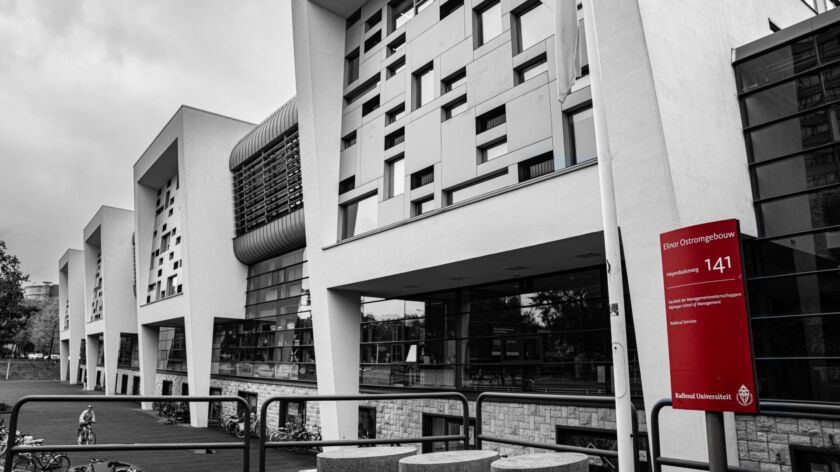Departments bear a heavy cost due to budget cuts at the Faculty of Management
-
 Foto en beeldbewerking: Johannes Fiebig
Foto en beeldbewerking: Johannes Fiebig
After years of generous spending, Radboud University is once again facing major cuts. How are the faculties dealing with this? Nijmegen School of Management is one faculty that knows about making cuts. The faculty may be back on track financially, but departments are paying a high price. Many colleagues are leaving.
After a sudden million-euro deficit loomed on the horizon last year, Nijmegen School of Management implemented a package of crisis measures. More than a year later, those measures are still largely in place in the Elinor Ostrom Building. This means that, with some exceptions, departing staff are not replaced and there are few opportunities for external hiring or conference visits.
Radboud University in overdraft
No faculty or university department will escape the cuts. But how do you handle such a project? In the coming weeks, VOX will be talking with the faculties: What can they save on, and what do they want to maintain at all costs? How much should these changes deliver and what will the staff and students notice? This is the fourth article in this series.
Part 1: Radboud University forced to make tough cuts, budget shrinks by tens of millions
Part 2: Faculty of Social Sciences bursting at the seams, but still required to save one million this year
The regime has had the desired effect, as reflected in the faculty’s 2025 budget. ‘The projections are favourable,’ says Dean Saskia Lavrijssen. ‘We were allowed a 6 million euro loss this year, but we have already saved an extra 1 million.’ Like all the other faculties, the School of Management must be able to break even in 2027. Until then, they are allowed to make limited losses.
Outflow
However, austerity comes at a price: the management faculty has to make do with fewer and fewer staff. Having started the 2024 calendar year with 437 full-time staff, the faculty only expects 360 FTEs will remain at the end of 2025. That is a contraction of almost 20 percent in two years.
This can partly be attributed to retirements and PhD candidates finishing, but additional staff have also left. ‘Some people moved to other universities, others took early retirement,’ says Lavrijssen. As this is paying off financially, the board is again allowing some departments to hire student assistants.
Next year, the faculty will loosen the reins a little further and departments will have slightly more scope to fill gaps in their staffing levels. Restrictions on travel and conference attendance will also be lifted, with budgets being made available again for each department.
Because the workload among staff is high, admits Administrative Director Jolle Landman. ‘Each department is obviously different, but we are at a limit. If too many people leave within a particular specialism, we will need to embark on a targeted search for replacements.’
Double hit
Funds from the sector plans would have come as a welcome relief. Although the cabinet will not be revisiting the already concluded sector plans, not all the sectors had been discussed. Like Economics and Business Administration, for example, which are now left out. Lavrijssen: ‘That affects the structural funding of three or four Assistant Professors.’
According to Landman, the faculty is therefore suffering a double hit from the cabinet plans. Because the Minister is also making cuts by not handing out any more starter and incentive grants. ‘We had fifteen grants every year,’ says Landman.
High study load
The faculty will therefore have to keep going with fewer lecturers. Can this be achieved without compromising the quality of the education? Lavrijssen remains optimistic: ‘Our study load and assessment pressure are quite high, which also creates a high workload for lecturers. Could that be reduced? After reviewing our educational programmes, we will need to make choices. Not all the subjects and specialisations are equally popular. We also encourage staff to work more together inside and outside the faculty. This will enable us to make smarter use of teaching capacity while improving the appeal of our educational offerings.’
‘Fortunately, faculty staff are very entrepreneurial’
Furthermore, the time that scholars spend on their teaching increases at the expense of their research time. ‘We were moving towards a 50/50 balance,’ says Lavrijssen, ‘but we can’t finance that now. We now apply 60/40.’
If scholars want to be able to devote more time to their research, they will therefore need to find external funding to do so. ‘Fortunately, people here are very entrepreneurial. For example, we want to work more with partners from the region.’
Staff Survey
While the board is still preaching optimism, the Faculty Joint Assembly (FGV) is thinking hard about the impact of the cuts. According to a response to the faculty’s budget from the participational bodies, they are already receiving signals of declining quality of education. ‘The full extent of the problem will become noticeable in the current academic year, when it appears that the teaching offerings have become impoverished and lecturers have less time to supervise students.’
The FGV points to worrying staff survey results, which show that the working atmosphere has become worse and the workload higher. According to the FGV, the faculty has become a less attractive employer, giving the improved financial situation ‘a black edge’.
The participational bodies are appealing to their board to draw up a fair and realistic plan for the future that recognises the issues of austerity. Specifically, students and staff want to have a discussion with the board on whether the pain of the cuts will be distributed fairly across departments, for example.





